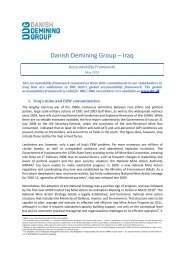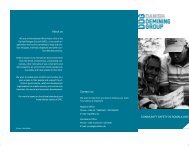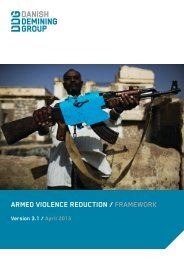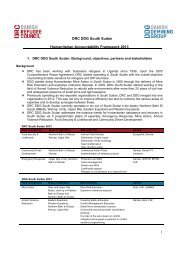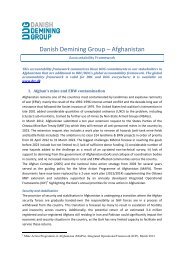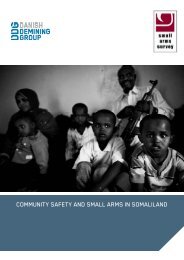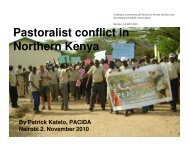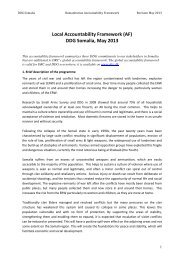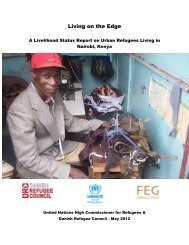Read the full report - Danish Refugee Council
Read the full report - Danish Refugee Council
Read the full report - Danish Refugee Council
Create successful ePaper yourself
Turn your PDF publications into a flip-book with our unique Google optimized e-Paper software.
CASH PROGRAMME REVIEW FOR IDPs IN KABUL INFORMAL SETTLEMENTS 29respondents. The majority of surveyed females (57%) preferred a combination of both cash and inkindassistance, followed by <strong>full</strong> cash assistance (42%) and <strong>full</strong> in-kind assistance (1.4%). The figureis different for male respondents, with <strong>the</strong> majority (58%) expressing a preference for <strong>full</strong> cashassistance, followed by a combination of both cash and in-kind (38%), with a little less than 4%preferring <strong>full</strong> in-kind assistance.Graph 8: Cash and/or in-kind assistance (%)?70,00Female60,0057,983256,9444Male50,0040,0041,666738,235330,0020,0010,00-3,78151,3889100% Cash assistance 100% In kind assistance 50% cash, 50% in kindassistanceAside from satisfying <strong>the</strong>ir food needs, male and female respondents expressed different priorities. Ifprovided with cash assistance, 25% male respondents expressed <strong>the</strong>ir preference to use it forrepayment of debts and using <strong>the</strong>m as working capital for small income generating activities (retailtrade/sales, street vending, establishing small retail shops etc.). Repaying debts andbuilding/upgrading shelter was mentioned by respectively 18% and 12% of <strong>the</strong> male populationsurveyed. Women however, preferred spending cash assistance on fuel (17.5%), repaying debts(15%) and clothing (7.5%).Willingness to participate in work and training programmes: The majority of male respondents(approximately 90%) responded positively to <strong>the</strong> question “are you willing to participate in a workprogramme for which you will be given money in return?”. Ano<strong>the</strong>r around 5% mentioned beingwilling to participate cash-for-work, provided <strong>the</strong> work was not physically intensive, while only 3%refused to work because <strong>the</strong>y were ei<strong>the</strong>r ill, disabled of physically weak. Cash-for-work initiativeshowever need to take into account <strong>the</strong> labour market in Kabul and <strong>the</strong> ability of recipients to integratein an urban labour environment. The fact that <strong>the</strong> majority of male respondents <strong>report</strong>ed beingemployed in agricultural and livestock activities prior to displacement, and lacking <strong>the</strong> basic skillsnecessary to participate in income generating activities in Kabul emphasizes <strong>the</strong> need for a longertermapproach including (i) upgrading of skills, and (ii), ensuring those skills are adapted to <strong>the</strong>demand on <strong>the</strong> labour market. Willingness to participate in work and training programmescorroborates male respondent’s intentions to invest into income-generating activities if assistance in<strong>the</strong> form of cash was to be provided, indicating a willingness to invest in longer –term strategies tostabilize <strong>the</strong>ir income. However, <strong>the</strong>se high figures might need to be mitigated in <strong>the</strong> light of findingsfrom previous research conducted in KIS, showing low preferences for cash assistance and littleinterest in cash-for-training 28 . When asked about training programmes with compensation in <strong>the</strong> formof cash, in-kind, or a combination of both, <strong>the</strong> majority were willing to participate. Most of <strong>the</strong>28 SAMUEL HALL CONSULTING (2012), Sustaining <strong>the</strong> Working Poor in <strong>the</strong> Kabul Informal Settlements, SolidaritésInternational.



